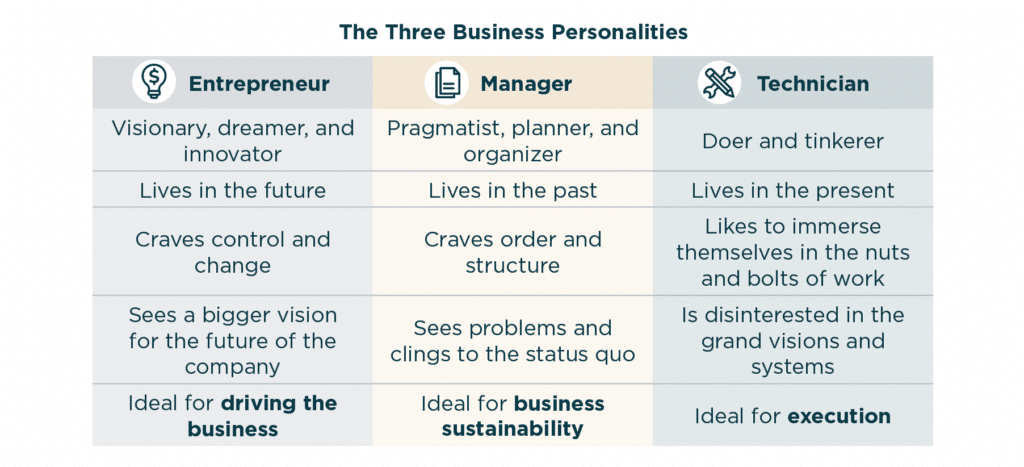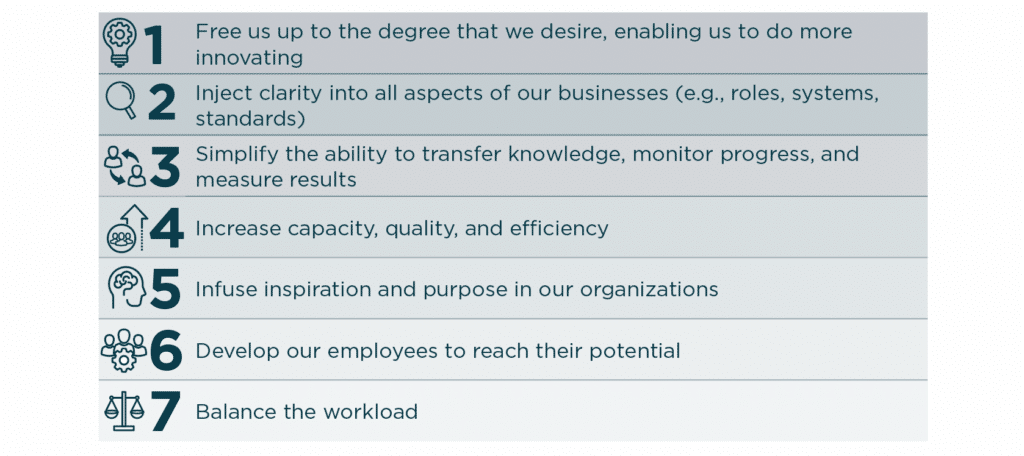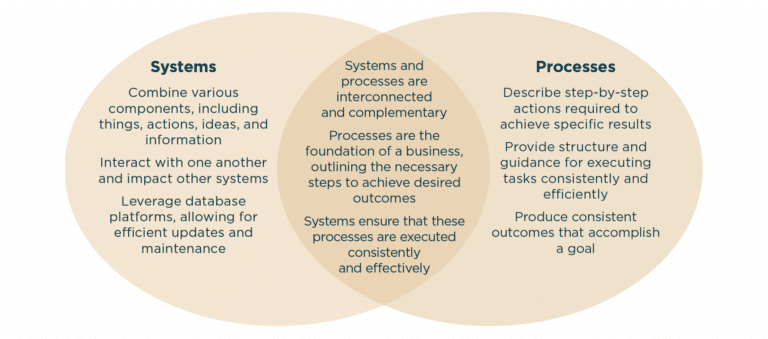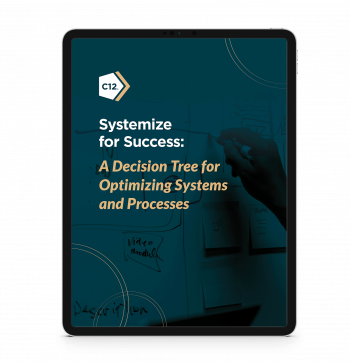Scaling with Systems and Processes – Inspired by Michael Gerber’s Insights from The E-Myth
Practical Insights for Enhancing Business Efficiency
As a small and midsize (SMB) business owner, feeling overwhelmed by the pressures of the business is common. Studies show that one in five SMB owners work over 80 hours a week, with over 90% using their free time and weekends to catch up on work or respond to work-related inquiries. This scenario is likely not what you envisioned when you became a business owner. While most business owners expect the early stages of their business to be challenging, many anticipate that, with time, they will gain more freedom to focus on the aspects of the business they are passionate about. However, the reality often falls short of this expectation.
Michael Gerber, a renowned business author and speaker, has dedicated his career to understanding the intricacies of entrepreneurship and effective business management. His seminal work, The E-Myth Revisited, delves into the common pitfalls that small business owners face and offers practical insights on creating scalable and sustainable business models. In this article, we will apply Michael Gerber’s insights to address the challenges of scaling your business by developing and implementing robust systems and processes. By leveraging these strategies, you can transform your business operations, reduce overwhelm, and achieve a more balanced and efficient workflow.
What Are Michael Gerber’s Biggest Insights in
The E-Myth?
In The E-Myth, Michael Gerber argues that many businesses fail, especially in their early years, because owners are misled by the “Entrepreneurial Myth” (or E-Myth). This myth is the mistaken belief that most businesses are started by true Entrepreneurs when in fact, they are usually started by Technicians—people skilled in a specific trade or discipline. The E-Myth is the fatal assumption that someone who excels at the technical work of a business can also effectively manage the business itself. To grasp the difference between these roles, it is crucial to understand the three roles or business personalities.

As Michael Gerber explains, the typical SMB owner is 70% Technician, 20% Manager, and 10% Entrepreneur. This imbalance often occurs because many business owners, such as doctors, plumbers, and physical therapists, start their businesses due to their expertise and success as Technicians.
However, the demands of running a business require a broader balance of skills. For businesses to thrive, CEOs must balance these personalities better. Although Gerber does not provide a specific recommendation for the ideal mix, the majority of a CEO’s time should be spent in the Entrepreneur and Manager roles, with a minority of time in the Technician role, delegating tasks where necessary. As a result, you must identify which business personality you assume most and create a plan to shift your role or delegate responsibilities, especially if you are too heavily weighted in the technician role.
The Power of Systems and Processes
Imagine winning an all-expenses-paid, two-week vacation. Would you feel confident leaving your business to operate smoothly in your absence? If not, it may indicate that your business heavily relies on your personal involvement, which can be risky. The real strength of effective systems and processes lies in creating a self-sufficient business that depends on systems, not just on its leader.

Many entrepreneurs and business leaders believe systems and processes will be restrictive and hinder innovation. The truth is, without systems and processes, you are guaranteed to hit a wall, stunting your growth. By having processes in place, you can gain more freedom because you will spend less time on repetitive tasks, giving you the time you need to problem-solve and innovate and thereby embracing your Entrepreneur role. Systems and processes will:

What Is the Difference between the Terms “Systems” and “Processes” in Business?
While some use the terms “systems” and “processes” interchangeably, these two terms have distinct definitions:
- Systems combine components (including things, actions, ideas, and information) that interact. They leverage databases to update and maintain your business operations.
- Processes describe the step-by-step actions required to achieve specific results. They lay the guardrails for executing tasks and are implemented to promote desired outcomes and efficiency.

Together, systems and processes work to consistently and effectively achieve your business goals.

Shifting from working in your business to working on your business is crucial—it empowers you to create a company that relies on the systems you have built rather than on you or a handful of individuals. Systems and processes are the keys that unlock this transformative journey.
How Do You Implement Systems and Processes in Your Business?
Whether you have been in business for decades or are just starting out, having the right systems in place is crucial. If your existing systems and processes are outdated or if crucial aspects of the business have not yet been systematized, it is essential to identify where improvements are needed. To help you get started, our free downloadable tool, Systemize for Success: A Decision Tree for Optimizing Systems and Processes, will help you analyze your current systems and pinpoint areas that require attention.
The “Followed by All” Checklist
Once you have identified the necessary systems and processes, ensuring that everyone involved follows the new standards is crucial. The Followed by All (FBA) checklist is an accountability tool that ensures employees properly implement the new processes to achieve the desired results. Each core process should have a corresponding FBA Checklist. The FBA Checklist includes the following steps:
- Train: Ensure that everyone involved in any steps of the process understands what to do, how to do it, and when to do it.
- Measure: Check if the steps are being done correctly and frequently enough and if they are yielding the desired results.
- Manage: Use the data from the measurement step to manage people and enforce accountability for following the process.
- Update: Continuously look for opportunities to change or simplify the process, acknowledging that the process itself might be the issue. Restart the FBA Checklist whenever changes are made.
With the checklist in place, you can seamlessly involve your employees in the new process and quickly achieve your desired results.
Making Your Business Systems-Dependent: A Case Study
Efficient systems and processes allow your business to scale. They make your business systems-dependent rather than leader-dependent, ensuring it works for you rather than because of you. Implementing healthy systems and processes frees senior management to focus on the higher-level work only they can do.
Brittany Zeller, founder of Tiny Feet Early Intervention, aims to provide high-quality behavioral learning services to families with children who have developmental delays. Initially, she onboarded all new employees herself, having them shadow her and training them using a large binder of material. However, as her team grew, this onboarding system, which was heavily reliant on her, became outdated. She needed a new onboarding system to better serve the company as it scaled.
Rapidly scaling business owners can relate to Brittany’s story. Systems and processes that are executive—or owner-dependent—will lead to overwhelm, and as the business grows, new systems and processes are necessary.
Scaling for Success
Michael Gerber’s insights are particularly relevant for today’s business leaders, who often find themselves overwhelmed by the operational demands of their growing enterprises. As your business scales, the systems and processes that once served you well may become outdated. This requires a proactive approach to continuously evaluate and refine these systems to meet new demands. Ongoing improvement in your systems and processes is essential for freeing up your time to innovate and focus on strategic growth.
By investing in robust systems and processes, you prepare your business for future challenges and unlock the true potential of your entrepreneurial vision. As you implement these strategies, you move from merely working in your business to working on it, ensuring it thrives and scales efficiently. Your mission is too important to rest solely on your shoulders. Embrace Michael Gerber’s insights and make your business systems-dependent, achieving sustainable growth and long-term success.
C12 Business Forums provides an architected environment for Christian business leaders that integrates work, life, and leadership transformation. To learn more about C12’s approach to Christ-centered business leadership, find a C12 Business Forum near you.
August 21, 2024






